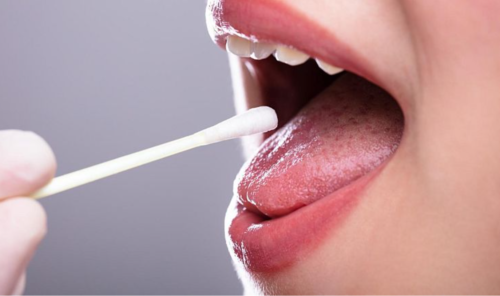Source: www.euronews.com
Author: Josephine Joly

Oral and throat cancers are notoriously difficult to detect – but a new saliva test, launched in the US, could change the game and enable much earlier diagnosis for patients. – Copyright Copyright: Canva
A new home screening test using artificial intelligence to detect oral and throat cancers from saliva samples has been launched in the United States, with hopes the device could change the future of oral and throat cancer detection.
With more than 90 per cent accuracy, the saliva test is the first to detect early signs of oral and throat cancers based on a technology that has received the US Food and Drug Administration’s (FDA) “breakthrough device” designation.
Notoriously difficult to detect, these cancers can often go undiagnosed until they have reached an advanced stage due to a lack of effective diagnostics tools, resulting in low survival rates.
Current screening methods rely on visual and tactile examinations by a healthcare provider, meaning lesions must grow large enough until they can be detected by the naked eye. Only 28 per cent of patients receive an early diagnosis, and those receiving a late diagnosis face a prolonged battle with oral cancer.
The five-year survival rates for oral and oesophageal cancers are 68 and 20.6 per cent respectively, but when detected early, those numbers can jump to more than 86 and 47 per cent. In the US alone, the National Cancer Institute estimates that there will be 54,000 new cases of oral cancer and 20,640 new cases of oesophageal cancer this year.
Looking to create a more accurate diagnostic tool to help cancer patients, researchers at the biotechnology company Viome started studying the changes to the microbiome – the collection of all microbes, such as bacteria, fungi, viruses, and their genes, that naturally live on our bodies and inside us – after earlier research had shown that people with oral or throat cancers had a different oral bacteria flora than people who are cancer-free.
“We collected saliva samples from people who were 50 years or older, or adults who had a history of tobacco use – both risk factors for oral and throat cancers. From each sample, we extracted genetic material from bacteria, fungi, and skin cells,” explained Guruduth Bavanar, head of Discovery, AI & Engineering at Viome and lead author of the study.
The scientists used genetic data from 945 samples, 80 of which came from people with oral cancer while 12 came from people with throat cancer, to train a machine-learning model.
“A major advantage of machine learning is that the more data we collect, the more accurate the tool becomes,” Bavanar told Euronews Next.
The model identified 88 distinct changes to gene expression in people with oral and throat cancer, as well as 182 genetic features unique to the bacteria found in samples from those people.
AI can detect breast cancer signs that radiologists don’t see, new study finds
The researchers then tested their model with the remaining 230 samples, 82 of which came from people with cancer.
It accurately identified 90 per cent of samples from people with cancer and 95 per cent of samples from people without, meaning there were very low rates of false negatives or false positives.
The saliva test they developed from their work, called CancerDetect, offers detection with 95 per cent specificity and 90 per cent sensitivity and is now available for purchase in the US.
‘A much-needed aid to detect early-stage cancer’
“With CancerDetect, Viome has developed a much-needed aid to detect early-stage cancer, leading to more successful treatment outcomes when confirmed with a biopsy,” Bavanar added.
People at high risk for oral or throat cancer can now buy the test online after filling out a questionnaire with Viome and get results within two weeks.
“A telehealth provider actually reviews the information provided by the customer before ordering the test. Licensed healthcare providers will contact the customer if there is a positive result and the customer can also contact a Viome telehealth partner to ask any questions they may have about the test,” explained Banavar.
The company said it will continue to pursue FDA approval, which, if granted, would mean the test would be covered by health insurance providers and available widely.

Leave A Comment
You must be logged in to post a comment.